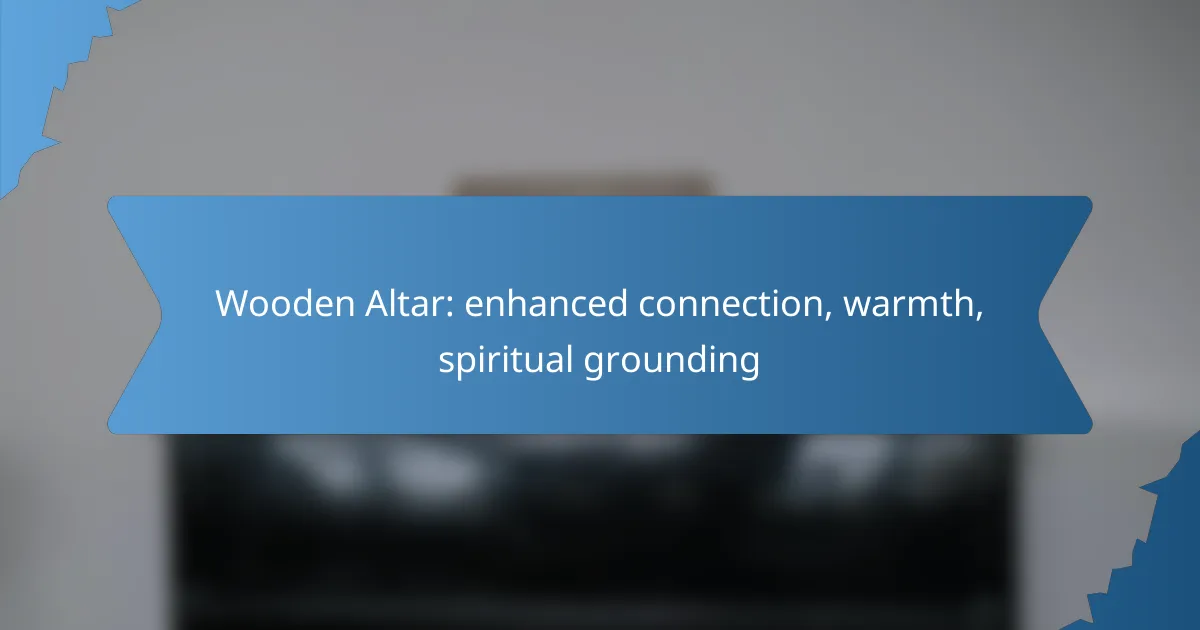A wooden altar enhances spiritual connection by creating a warm, inviting space that encourages reflection and mindfulness. Its natural qualities promote a sense of grounding, making it easier to engage with spiritual practices and deepen one’s beliefs. By serving as a focal point for meditation and rituals, a wooden altar fosters a sacred environment that enriches the overall spiritual experience.

How does a wooden altar enhance spiritual connection?
A wooden altar enhances spiritual connection by creating a warm, inviting space that encourages reflection and mindfulness. The natural qualities of wood promote a sense of grounding, making it easier to engage with spiritual practices and foster a deeper connection to one’s beliefs.
Natural materials foster grounding
Wood, as a natural material, has inherent qualities that promote grounding and stability. The tactile sensation of wood can evoke a sense of calm and connection to nature, which is essential for spiritual practices. Incorporating elements like live edges or rough textures can further enhance this grounding effect.
Choosing sustainably sourced wood can also deepen the connection, as it aligns with values of respect for the environment. Consider using local woods that resonate with your personal or cultural heritage to strengthen this bond.
Symbolic representation of faith
A wooden altar often symbolizes the connection between the earthly and the divine. The organic nature of wood can represent growth, renewal, and the cycles of life, making it a powerful focal point for spiritual rituals. Many cultures use wood in their sacred spaces, reinforcing its significance in faith practices.
Personalizing the altar with carvings, symbols, or items that reflect your beliefs can enhance its spiritual meaning. This customization allows the altar to become a unique representation of your faith journey, making it more impactful in your spiritual practice.
Facilitates mindfulness practices
Using a wooden altar can significantly enhance mindfulness practices by providing a dedicated space for meditation, prayer, or reflection. The warmth of the wood can create a serene atmosphere that encourages focus and tranquility, essential for effective mindfulness exercises.
To maximize the benefits, consider incorporating elements like candles, crystals, or incense on your altar. These items can help create a multi-sensory experience that deepens your mindfulness practice, making it easier to stay present and engaged.

What types of wooden altars are available?
Wooden altars come in various styles, each serving different needs and spaces. The main types include freestanding, wall-mounted, and custom-built options, allowing individuals to choose based on their spiritual practices and available space.
Freestanding wooden altars
Freestanding wooden altars are versatile and can be placed anywhere in a room, making them ideal for dedicated spiritual spaces. They often come in various sizes, from small tables to larger structures, accommodating different rituals and items.
When selecting a freestanding altar, consider the height and width to ensure it fits comfortably in your space. Look for features like drawers or shelves for storage, which can help keep your altar organized and functional.
Wall-mounted wooden altars
Wall-mounted wooden altars save floor space and can create a focal point in a room. These altars are typically smaller and can be installed at a height that suits your practice, allowing for easy access to your spiritual items.
When choosing a wall-mounted altar, ensure it is securely installed to support the weight of your items. Consider the wall’s material and the altar’s design to match your decor while providing a serene atmosphere for your spiritual activities.
Custom-built wooden altars
Custom-built wooden altars offer the greatest flexibility, allowing you to design an altar that perfectly meets your spiritual needs. You can choose the dimensions, materials, and features that resonate with your practice, whether it’s for meditation, prayer, or rituals.
When commissioning a custom altar, communicate your specific requirements clearly to the craftsman. Discuss wood types, finishes, and any additional elements like carvings or compartments to ensure the final product aligns with your vision and enhances your spiritual connection.

What are the benefits of using a wooden altar?
Using a wooden altar offers numerous benefits, including enhanced connection to spiritual practices, warmth in the environment, and a grounding effect during rituals. These altars serve as focal points for meditation and reflection, creating a sacred space that fosters a deeper spiritual experience.
Creates a warm atmosphere
A wooden altar naturally brings warmth to any space due to its organic texture and color. The natural grains and tones of wood can evoke feelings of comfort and tranquility, making it an inviting centerpiece for spiritual activities.
To enhance this warm atmosphere, consider incorporating soft lighting or natural elements like plants and stones. These additions can complement the wooden altar, creating a serene environment conducive to meditation and reflection.
Encourages personal reflection
Wooden altars provide a dedicated space for personal reflection, allowing individuals to engage with their thoughts and feelings more deeply. The tactile nature of wood can inspire a sense of connection, encouraging users to spend time in contemplation.
To maximize this benefit, set aside regular time for reflection at your altar. Journaling or using meaningful objects can help focus your thoughts and enhance the reflective experience.
Supports spiritual rituals
Wooden altars are ideal for supporting various spiritual rituals, from daily prayers to seasonal celebrations. The stability and presence of a wooden altar can enhance the significance of these practices, making them feel more intentional and sacred.
When preparing for a ritual, consider the specific items you want to place on the altar, such as candles, crystals, or symbols that resonate with your spiritual beliefs. Organizing these elements thoughtfully can create a powerful focal point for your rituals.

How to choose the right wooden altar for your space?
Choosing the right wooden altar involves considering its size, wood type, and design to ensure it fits harmoniously in your space while enhancing your spiritual practice. A well-selected altar can foster a deeper connection, warmth, and grounding in your spiritual activities.
Consider size and dimensions
The size of your wooden altar should align with the available space and your personal needs. Measure the area where you plan to place the altar to ensure it fits comfortably without overwhelming the room.
Common altar sizes range from small tabletop models to larger freestanding structures. A compact altar may be suitable for smaller spaces, while larger ones can accommodate more items and provide a more prominent focal point.
Evaluate wood type and finish
Different types of wood offer varying aesthetics and durability. Popular choices include oak, pine, and cedar, each bringing its unique texture and color. Oak is sturdy and classic, while cedar has a pleasant aroma and natural resistance to decay.
Consider the finish as well; a natural finish can highlight the wood’s grain, while a stained finish can add depth and character. Ensure the finish is non-toxic, especially if you will be using the altar for rituals involving food or personal items.
Assess design and functionality
The design of your wooden altar should reflect your personal style and spiritual needs. Look for features that enhance functionality, such as shelves for storage, compartments for sacred items, or a flat surface for offerings and rituals.
Think about how you intend to use the altar. If you plan to perform rituals frequently, a design that allows easy access to your items and provides ample space for activities will be beneficial. Avoid overly ornate designs that may distract from your spiritual focus.

What are the best practices for maintaining a wooden altar?
To maintain a wooden altar, focus on regular cleaning, protective treatments, and seasonal care. These practices enhance the altar’s appearance and longevity, ensuring it remains a sacred space for spiritual connection.
Regular cleaning techniques
Regular cleaning is essential to preserve the beauty of your wooden altar. Use a soft, lint-free cloth to gently wipe away dust and debris, ideally once a week. For deeper cleaning, a mixture of mild soap and water can be used, but avoid soaking the wood.
Always dry the altar thoroughly after cleaning to prevent moisture damage. Avoid harsh chemicals or abrasive materials, as they can scratch or dull the wood’s finish.
Protective treatments for longevity
Applying protective treatments can significantly extend the life of your wooden altar. Consider using a high-quality wood polish or wax every few months to nourish the wood and create a protective barrier against moisture and dirt.
For added protection, you might also use a clear wood finish or sealant, especially if the altar is exposed to varying humidity levels. Be sure to follow the manufacturer’s instructions for application and drying times.
Seasonal care tips
Seasonal changes can impact the condition of your wooden altar, so adjust your care routine accordingly. In humid months, ensure proper ventilation around the altar to prevent mold growth. In dry seasons, consider using a humidifier nearby to maintain moisture levels.
Additionally, inspect the altar regularly for signs of wear or damage, such as cracks or peeling finishes. Addressing these issues promptly can prevent more extensive repairs later on.

How can wooden altars be incorporated into modern spirituality?
Wooden altars can enhance modern spirituality by providing a tangible space for reflection, meditation, and connection to nature. They serve as focal points for rituals, helping individuals ground their spiritual practices in physical form.
Creating a Personal Space
To incorporate a wooden altar into your spiritual practice, start by selecting a dedicated area in your home that feels peaceful and inviting. This could be a corner of a room, a small table, or even a windowsill. Ensure the space is free from distractions to foster a deeper connection during your spiritual activities.
Choose a wooden altar that resonates with you, considering factors like size, wood type, and design. A simple, handcrafted altar can provide a warm, personal touch, while a more elaborate one may serve as a statement piece in your spiritual practice.
Incorporating Rituals and Offerings
Wooden altars can be enhanced with various rituals and offerings that reflect your spiritual beliefs. Common practices include placing candles, crystals, or meaningful objects on the altar to create a sacred space. You might also consider incorporating seasonal elements, such as flowers or herbs, to connect with nature’s cycles.
Regularly cleansing your altar can help maintain its spiritual energy. This can be done by using sage, incense, or simply wiping it down with a cloth while setting your intentions for the space.
Connecting with Nature
Wooden altars naturally promote a connection to nature, making them ideal for spiritual practices that emphasize harmony with the environment. Consider placing your altar near a window or outdoors, where it can receive natural light and fresh air. This enhances the overall experience and deepens your spiritual grounding.
Incorporating natural elements, such as stones, plants, or water, can further enhance the connection to the earth. These elements can serve as reminders of the beauty and cycles of life, enriching your spiritual journey.
